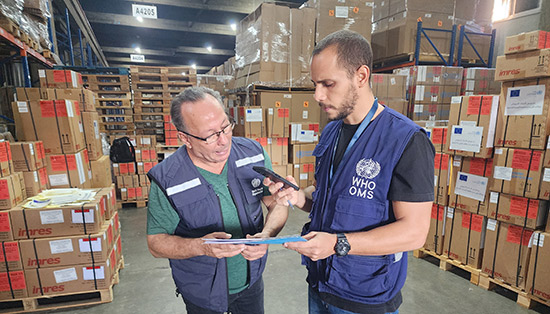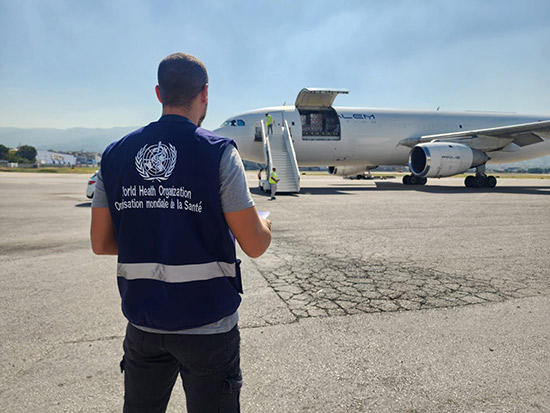 14 October 2024, Beirut, Lebanon – Mahmoud Sabra is the senior logistics and supplies officer at WHO’s Country Office in Lebanon. He joined the WHO team in 2020 during the height of the COVID-19 pandemic when logistical support was one of the main pillars of the response and has since worked through a series of emergencies including the Beirut blast in August 2020, the cholera outbreak in October 2022 and now the devastating conflict with Israel.
14 October 2024, Beirut, Lebanon – Mahmoud Sabra is the senior logistics and supplies officer at WHO’s Country Office in Lebanon. He joined the WHO team in 2020 during the height of the COVID-19 pandemic when logistical support was one of the main pillars of the response and has since worked through a series of emergencies including the Beirut blast in August 2020, the cholera outbreak in October 2022 and now the devastating conflict with Israel.
Throughout, Mahmoud has been an indispensable team member, contributing to the success of WHO’s response operations. His drive stems from the sense of obligation instilled in him after his father suffered a stroke when Mahmoud was 10-years-old. This life-altering experience underlies his devotion to ensuring that health services are accessible to all.
Speaking while working with warehouse teams to assemble kits for distribution to referral hospitals across Lebanon to support mass casualty management and surgical trauma, Mahmoud reflected on his job and experiences.
“Logistics work in health is only visible when there is a problem,” he said, “when there is a delay or damage to a medical shipment. When supplies are delivered on time our work usually goes unnoticed.”
The catastrophic emergency unfolding in Lebanon has placed an enormous strain on the health system, leaving hospitals struggling to cope with an influx of patients, many with horrific injuries.
WHO recently delivered over 116 metric tonnes of trauma and surgical supplies, cholera and mental health supplies and medications valued at US$ 2 million. The supplies from WHO's logistics hub in Dubai were delivered over 2 days on 4 separate private and military flights facilitated by the government of the United Arab Emirates, through the generous donation by the European Civil Protection and Humanitarian Aid Operations (ECHO).
While the humanitarian support landing at Rafik Hariri International Airport in Beirut does so in the full glare of the media, the cameras seldom zoom in on the diligent workers who make the process possible.
“I don’t mind being in the background. After delivery of the supplies, I will often go to hospitals where they are utilized and see patients receiving lifesaving care and treatment. It renews my energy and motivates me to carry on despite all the difficulties,” says Mahmoud.
 Logistics work and its role in emergency response is often misunderstood. Logistics teams do not simply deliver medicines and medical supplies, they work hand-in-hand with project and procurement teams to prepare purchase orders, select suppliers, propose and facilitate means of transport, distribute supplies and maintain warehouses for efficient storage and dispatch.
Logistics work and its role in emergency response is often misunderstood. Logistics teams do not simply deliver medicines and medical supplies, they work hand-in-hand with project and procurement teams to prepare purchase orders, select suppliers, propose and facilitate means of transport, distribute supplies and maintain warehouses for efficient storage and dispatch.
At this point, Mahmoud was close to assembling the first of 13 kits which were dispatched that same day to 6 referral hospitals in Beirut to support in mass casualty management and surgical trauma.
“Health and peace are closely linked,” said Mahmoud, “and our work is made infinitely more difficult by emergencies like the current war, but I will continue to go out of my way and offer as much support as I can.”
Through the dedication of invisible soldiers like Mahmoud, WHO continues its work to support Lebanon’s Ministry of Public Health and enhance access to lifesaving trauma and emergency medical care services while continuing to provide uninterrupted primary and secondary health care for acute chronic conditions.
WHO calls on all states engaged in armed conflict to look for peaceful alternatives and invest in health and development. Health is a right not an option, and no one pays the price of war more than the sick and the vulnerable, including women and children.


